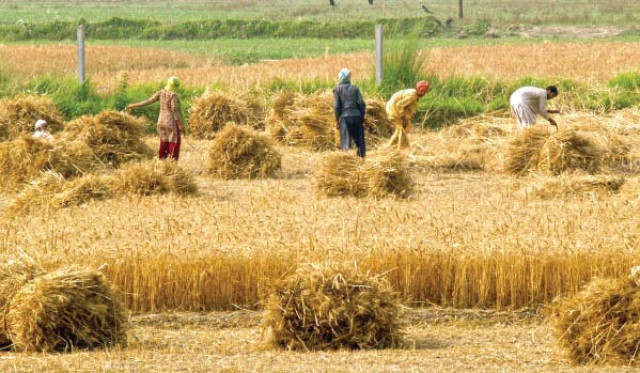Political commodities: Govt to begin wheat procurement in second week of April
Farmers complain that the increase in wheat support price is not enough.

The announcement was made by Punjab Food Director Najam Shah and Passco General Manager Tanveer Hussain at a seminar organised by the Agricultural Journalists Association in Lahore on Friday. Both men said they were awaiting a final work on the government’s procurement targets and support prices to begin their operations. In a remnant of the semi-planned economy that Pakistan began running in the late 1950s, the government still intervenes in a few key agricultural commodities in a bid to control both price and access. Wheat and sugarcane are the two biggest examples. The government announces a support price for wheat – as well as a procurement target – and then goes about purchasing it through Passco and the provincial food departments.
This year, the government has announced a support price of Rs26.25 per kilogramme, up 10.5% from last year’s price of Rs23.75 per kilogramme. The support price is available to all those who receive gunny bags from the government, a practise that many farmers groups say allows officials to solicit bribes in order to receive the bags, which guarantee receipt of the full price.
The arrangements for the procurement drive are elaborate. The Punjab food department expects to buy four million tons of wheat and 3.5 million tons of other grains. Passco will begin its procurement drive after the provincial governments have completed theirs and expects to buy another 1.5 million tons of wheat. Passco will buy wheat from 20 tehsils (sub-district units) in Punjab, Sindh and Balochistan and will set up to seven procurement centres in each tehsil.
In a bid to control the fraudulent use of gunny bags, the Punjab government said it will not be handing out bags to farmers who have already received them for at least 15 days.
The wheat procurement drive is one of the most expensive undertakings of the government and one that is financed entirely through bank borrowing. The Punjab government says it has already negotiated with a consortium of 29 banks to borrow up to Rs200 billion to finance its procurement efforts and an agreement is expected to be signed next week.
In a country with poorly managed supply chains, Passco has one of the largest storage capacities in Pakistan. The company can store 430,000 tons of wheat in covered silos and has arranged for financing from the Islamic Development Bank to build silos to store 650,000 tons more. The new silos are expected to be completed by 2014.
Despite the government’s efforts to keep both farmers and consumers happy, many of the farmers’ groups present at the seminar were unhappy.
“The costs of agricultural inputs like fertilisers, electricity, diesel and pesticides have gone up manifold over the last two years,” said Sarfraz Khan, vice president of the Kisan Board of Pakistan, a lobbying group. “The increase in wheat support price is not enough.”
Other criticised the government’s procurement and marketing mechanisms. “The government agencies involved in marketing agricultural commodities lack the necessary swift decision-making capacity, which has resulted in Pakistan not being able to sell its surplus wheat stocks,” said Hamid Malhi, president of the Wheat Growers Association.
Bilal Aslam Sufi, former head of the Pakistan Flour Millers Association, said that the increase in wheat support price would increase the retail price of floor by as much as Rs5 per kilogramme, or about 15.2% more than the current average retail flour price of about Rs33 per kilogramme.
Published in The Express Tribune, March 24th, 2012.



















COMMENTS
Comments are moderated and generally will be posted if they are on-topic and not abusive.
For more information, please see our Comments FAQ